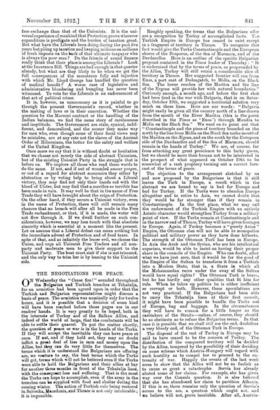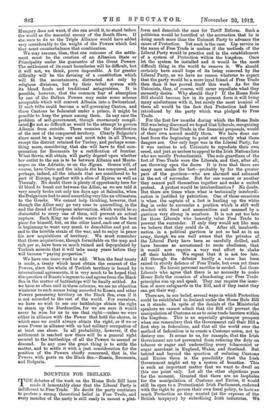THE NEGOTIATIONS FOR PEACE.
ON Wednesday the " Cease fire! " sounded throughout the Bulgarian and Turkish trenches at Tchatalja, for an armistice had been agreed upon in order that the Turkish and Bulgarian representatives might discuss a basis of peace. The armistice was nominally only for twelve hours, and it is possible that a decision of some kind will have been reached before these pages are in our readers' hands. It is very greatly to be hoped, both in the interests of Turkey and of the Balkan Allies, and indeed of the world at large, that the combatants will be able to settle their quarrel. To put the matter shortly, the question of peace or war is in the hands of the Turks. If they will accept the inevitable they can have peace at once. If not, and if they hold out, they may no doubt inflict a great deal of loss in men and money upon the Allies, but they can do very little for themselves. The terms which it is understood the Bulgarians are offering are, we venture to say, the best terms which the Turks will get, terms which will not be bettered even if the Turks were able to hold the Bulgarians and their allies at bay for another three months in front of the Tchatalja lines, with the coseequeat loss and suffering. That is the most the Turks can hope to accomplish, even if the army in the trenches can be supplied with food and shelter during the coming winter. The notion of Turkish rule being restored Salomika, Macedonia, and Thrace is not only intolerable ; it is impossible. Roughly speaking, the terms that the Bulgarians offer are a recognition by Turkey of accomplished facts. The Turkish Empire in Europe has ceased to exist except in a fragment of territory in Thrace. To recognize this fact would give the Turks Constantinople and the European shores of the Bosporus, of the Sea of Marmora, and of the Dardanelles. Here is an outline of the specific Bulgarian proposal contained in the Times leader of Thursday : " It is understood that by the terms of peace, as propounded by the Allies, Turkey will still retain a considerable slice of territory in Thrace. Her suggested frontier will run from Enos, a port east of Dedeagatch, to Midis, on. the Black Sea. The lower reaches of the Maritza and the line of the Ergene will provide her with natural boundaries." Curiously enough, a month ago, and before the first shot had been fired in the war with Bulgaria, that is on Satur- day, October 19th, we suggested a territorial solution very much on these lines. Here are our words : " Bulgaria might easily be given all the country north of a line drawn from the mouth of the River Maritza (this is the point described in the Times as Enos ') through Mandra to Midia on the Black Sea." We went on to point out that " Constantinople and the piece of territory bounded on the north by the line from Midia on the Black Sea to the mouth of the Maritza on the/Egean, and on the south by the European side of the Dardanelles and of the Sea of Marnaora, should remain in the hands of Turkey." We are, of course, far from attaching any great prescience to this lucky guess, but we should be more than human not to be interested in the prospect of what appeared on October 19th to be somewhat of a rash prophecy turning out a correct fore- cast of the terms of peace.
The objection to the arrangement sketched by us and now proposed by the Bulgarians is that it still leaves the Turk in Europe, a result which in the abstract we are bound to say is bad for Europe and bad for Turkey. If the Turks were to abandon Europe altogether and to retire to Asia, we cannot doubt that they would be far stronger than if they remain in Constantinople. In the first place, what we may call the endowment of the Turkish Empire with an entirely Asiatic character would strengthen Turkey from a military point of view. If the Turks remain at Constantinople and in the narrow end of Thrace, Turkey will have given hostages to Europe. Again, if Turkey becomes a, "purely Asian" Empire, the Ottoman clan will not be able to monopolize political and military power as they have done hitherto. The strength of the Ottoman Turk has been in Europe. In Asia the Arab and the Syrian, who are his intellectual superiors, would be able to insist on having their proper share in the councils of the Empire. Who can doubt, after what we have just seen, that it would be for the good of the Empire of the Sultan to transform it from a Turkish into a Moslem State, that is, a State in which all the Mohammedan. races under the sway of the Sultan would have equal rights ? The Ottoman Turk is brave, but he has hardly any other qualities that fit him for rule. When he takes up politics he is either inefficient or corrupt or both. However, these speculations are not very practical. If the Bulgarians had been able to carry the Tchatalja lines at their first assault, it might have been possible to bundle the Turks out of Europe, bag and baggage. In the circumstances they will have to remain for a little longer as the caretakers of the Straits—unless, of course, they should be so obstinate as to refuse the Bulgarian terms. In that case it is possible that we shall still see the end, doubtless a very bloody end, of the Ottoman Turk in Europe.
The disposal of the rest of Turkey in Europe may be said to have ceased to be the concern of Turkey. The distribution of the conquered territory will be decided by the Allies, tempered by the possibility of their deciding on some scheme which Austria-Hungary will regard. with such hostility as to compel her to proceed to the ex- tremity of war. Happily the events of the last week seem to show that the Allies will not be so foolish as to cause so great a catastrophe. Servia has already abated some of her claims. For example, she has given way over the. Consuls question. It is also believed that she has abandoned her claim to partition Albania. If this is so, there remains only the question of Servia's access to the sea, a question which ought not, and we believe will not, prove insoluble. After all, Austria- Hungary does not want, if she can avoid it, to stand before the world as the essential enemy of the South Slays. If she were to do so the Triple Alliance would have added very considerably to the weight of the Powers which feel they must counterbalance that combination. We may assume, then, that one outcome of the settle- ment must be the creation of an Albanian State or Principality under the guarantee of the Great Powers. The settlement of its exact boundaries will be difficult, but it will not, we think, prove impossible. A far greater difficulty will be the devising of a constitution which will fit the mountaineers, distracted not only by religious divisions, but by their tribal system with its blood feuds and traditional antagonisms. It is possible, however, that the common fear of absorption by one of the Balkan Powers may make some scheme acceptable which will convert Albania into a Switzerland. If each tribe could become a self-governing Canton, and those Cantons be federated under a prince, it might be possible to keep the peace among them. In any case the problem of self-government, though enormously compli- catedlis not so difficult as would be the attempt to govern Albania from outside. There remains the distribution of the rest of the conquered territory. Clearly Bulgaria's share must be a large one and must take in all Thrace, except the district retained for Turkey, and perhaps some- thing more, considering that she will have to find com- pensation for Roumania by a rectification of frontier. What Servia will obtain will partly depend upon whether her outlet to the sea is to be between Albania and Monte- negro on the Adriatic, or on the lgean. Greece will, of course, have Crete and the islands she has conquered, and perhaps, indeed, all the islands that are considered to be part of Europe, together with a slice of Epirus as well as Thessaly. No doubt there is plenty of opportunity here for ill blood to break out between the Allies, as we are told it very nearly broke out only ten days ago at Salonika, when the Bulgarians had to send something very like an ultimatum to the Greeks. We cannot help thinking, however, that though the Allies may go very near to quarrelling, in the end the dread of European intervention, which would be so distasteful to every one of them, will prevent an actual rupture. Each King no doubt wants to snatch the best piece for himself, but, on the other hand, each one of them is beginning to want very much to demobilize and put an end to the terrible strain of the war, and to enjoy in peace his new acquisitions of territory. We must remember that those acquisitions, though formidable on the map and rich per se, have been so much ruined and depopulated by Turkish misrule that it will take many years before they will become " paying properties."
We have one more word to add. When the final treaty is made, a treaty which must obtain the consent of the Powers, since the whole of Turkish territory is bound by international agreements, it is very much to be hoped that the question of Russia's ingress to and egress from the Black Sea in the matter of battleships will be finally settled. As we have so often said in these columns, we see no objection whatever to such access being accorded to Russia and other Powers possessing territory on the Black Sea, even if it is not accorded to the rest of the world. For ourselves, we have no wish to see our battleships obtain the right to steam up the Dardanelles, for we are sure it would never be wise for us to use that right—unless we were either in alliance with the Power that held the shores, in which ease we could always obtain the right, or if we or some Power in alliance with us had military occupation of at least one shore. In all probability, however, if the settlement is reached now there will be a general right secured to the battleships of all the Powers to ascend or descend. In any case the great thing is to settle the matter, and to settle it with a just consideration for the position of the Powers chiefly concerned, that is, the Powers with ports on the Black Sea—Russia, Roumania, and Bulgaria.















































 Previous page
Previous page